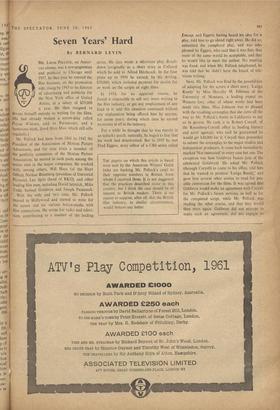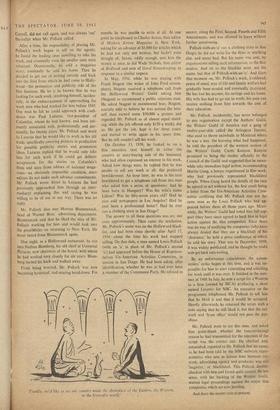Seven Years' Hard
By BERNARD LEVIN
Mr. Pollock had been from 1941 to 1942 the President of the Association of Motion Picture Advertisers, and for nine years a member of the publicity committee of the Motion Picture Association; he moved in such posts among the senior men in the major companies. He worked with, among others, Will Hays (of the Hays Office), Nathan Blumberg (president of Universal Pictures), Leo Spitz (head of RKO), and other leading film men, including David Selznick, Mike Todd, Samuel Goldwyn and Joseph Pasternak.
With his wife and two sons, Mr. Pollock moved to Hollywood and started to write for the screen and for various fiction-media with film connections. He wrote for radio and televi- sion, contributing to a number of the leading series. He also wrote a television play Break- down (originally as a short story in Colliers) which he sold to Alfred Hitchcock. In the four years up to 1954 he earned, by his writing, $50,000, which included payment for stories for or work on the scripts of eight films.
In 1954, for no apparent reason, he found it impossible to sell any more writing to the film industry, or get any employment of any kind in it, and this situation continued without any explanation being offered him by anyone, for seven years; during which time he earned no money at all in the industry.
For a while he thought that he was merely in an unlucky patch; naturally, he began to fear that his work had deteriorated. But in 1957 he met Fred Eggers, story editor of a CBS series called THE papers on which this article is based were sent by the American Writers' Guild (who are backing Mr. Pollock's case) to their opposite numbers in Britain, from whom I received them. It is not suggested that the practices described occur in this country, but I think the case should be of interest to British readers. There is no reason to suppose, after all, that the British film industry, in similar circumstances, would behave any better. Lineup, and Eggers, having heard his idea for a play, told him to go ahead right away. He did so, submitted the completed play, and was tele- phoned by Eggers, who said that it was fine, that more of the same would be acceptable, and that he would like to meet the author. No meeting was fixed; and when Mr. Pollock telephoned, he was told that he 'didn't have the knack of tele- vision writing: Next, Mr. Pollock was fired by the possibilities of adapting for the screen a short story, `Latigo Randy' by Miss Dorothy M. Johnson of the University of Montana, a leading expert on Western lore, other of whose works had been made into films. Miss Johnson was so pleased with the resulting screenplay that she came all the way to Mr. Pollock's home in California to say so in person. He took it to Robert Coryell, of the Rosenberg-Coryell office (a leading literary and actor agency), who said he guaranteed he would get $40,000 for it. Coryell then proceeded to submit the screenplay to the major studios and independent producers. It came back immediately marked 'Not interested' in every case but one. The exception was Sam Goldwyn Junior (son of the celebrated Goldwyn). He asked Mr. Pollock (through Coryell) to come to his office, told him that he wanted to produce `Latigo Randy,' and gave him several other stories to read for pos- sible conversion for the films. It was agreed that Goldwyn would make an agreement with Coryell for Mr. Pollock's future services, as well as for the completed script, while Mr. Pollock was reading the other stories, and that they would then meet again. Goldwyn did not attempt to make such an agreement, did not explain to Coryell, did not call again, and was always 'out' thereafter when Mr. Pollock called.
After a time, the impossibility of placing Mr. Pollock's work began to tell on the agents; he found the leading ones unwilling to take his work, and eventually even the smaller ones were reluctant. Occasionally, he sold a magazine story; eventually he sold his home. Then he decided to get out of writing entirely and back into the field from which he had come to Holly- wood--the promotion and publicity side of the film business. He let it be known that he was looking for such work, involving himself, inciden- tally, in the embarrassment of approaching for work men who had worked for him before 1945. One man he felt he could approach with confi- dence was Paul Lazarus, vice-president of Columbia, whom he had known, and been inti- mately associated with, professionally and per- sonally, for twenty years. Mr. Pollock sent word to Lazarus that he would like to work in his old trade, specifically covering pictures in production for possible publicity stories and promotion ideas. Lazarus replied that he would only take him for such work if he could get definite acceptances for the stories on Columbia's films and stars from editors of national maga- zines—an obviously impossible condition, since editors do not make such advance commitments. Mr. Pollock wrote direct to Lazarus (he had previously approached him through an inter- mediary) explaining this and saying he was willing to be of use in any way. There was no reply.
Mr. Pollock also met Morton Blumenstock, head of Warner Bros.' advertising department. Blumenstock said that he liked the idea of Mr. Pollock working for him and would look into the possibilities on returning to New York. He never heard from Blumenstock again.
One night, in a Hollywood restaurant, he ran into Nathan Blumberg, his old chief at Universal Pictures, now chairman of the board, with whom he had worked very closely for six years. Blum- berg turned his back and walked away.
From being worried, Mr. Pollock was now becoming hysterical, and nearing breakdown. For months he was unable to write at all. At one point he telephoned to Charles Saxon, then editor of Modern Screen Magazine in New York, asking for an advance of $1,000 for articles which he had not only not written, but hadn't even thought of; Saxon, oddly enough, sent him the money at once, as did Wade Nichols, then editor of Redbook and now of Good Housekeeping. in response to a similar request.
In May, 1956, while he was staying with Frank Nugent (the writer of John Ford screen- plays), Nugent received a telephone call from the Hollywood Writers' Guild asking him (Nugent) to recommend a public relations man. He asked Nugent to recommend him; Nugent, scarcely able to believe he was serious (he him- self then earned some $50,000 a picture and regarded Mr. Pollock as of -almost equal stand- ing, while the job offered only $150 a week), did so. He got the job, kept it for three years, and started to write again in his spare time. But he still couldn't sell his work.
On October 15, 1959, he looked in on a film executive (not himself in either the creative or story-buying side of the business), who had often expressed an interest in his work. Asked hOw things were, he replied that he was unable to sell any work at all; this produced bewilderment. An hour later, he was in his turn bewildered to get a telephone call from this man who asked him a series of questions: had he been born in Hungary? Was his wife's name Lillian? Was he fifty-seven years old? Had he ever sold newspapers in Los Angeles? Had he ever been a professional boxer? Had he ever run a clothing store in San Diego?
The answer to all these questions was no; not even approximately. Then came the revelation. Mr. Pollock's name was on the Hollywood black- list, and had been since shortly after April 17, 1954— about the time his work had stopped selling. On that date, a man named Louis Pollack (with an 'a' in place of Mr. Pollock's second 'ci') had appeared before the House of Represen- tatives Un-American Activities Committee, in session in San Diego. He had been asked, after identification, whether he was or had ever been a member of the Communist Party. He refused to
'Frankly, we'd like to see our country made the showplace of the Eastern, the Western, or the Neutralist world.'
answer, citing the First, Second, Fourth and Fifth Amendments, and was allowed to leave without further questioning.
Pollack-with-an-'a' ran a clothing store in San Diego; he did not write for the films or anything else, and never had. But his name was sent, by organisations selling such information, to the film studios. And on to the blacklist went, not his name, but that of Pollock-with-an-`o'. And from that moment on, Mr. Pollock's work, livelihood, peace of mind. way of life and family welfare had gradually been eroded and eventually destroyed. He has lost his income, his savings and his home. His wife has had to go out to work; his sons can receive nothing from him towards the cost of their education.
Mr. Pollock, incidentally, has never belonged to any organisation except the Authors' Guild, the Writers' Guild of America and a gang of twelve-year-olds called. the Arlington Terrors, who used to throw snowballs in Montreal where he was a boy. On learning what had happened, he told the president of the western section of the Writers' Guild. Curtis Kenyon. Kenyon promised to bring the matter officially to the Council of the Guild, and suggested that he mean- while take immediate legal action, recommending Martin Gang, a lawyer experienced in film work, who had previously represented blacklisted people. When Gang heard the details of the case he agreed to act without fee, the first result being a letter from the Un-American Activities Com- mittee certifying that Mr. Pollock was not the same man as the Louis Pollack who had ap- peared before them all those years ago. Mean- while, the Writers' Guild had voted him full sup- port (they have since agreed to back him in legal action against the film companies). Since there was no way of notifying the companies (who have always denied that they use a blacklist) of his 'clearance,' he held a press conference at which he told his story. That was in December, 1959, it was widely publicised, and he thought he could now get back into writing.
By an unfortunate coincidence, the screen- writers' strike began at this time, and it was im- possible for him to start submitting and soliciting for work until it was over. It finished in the sum- mer of 1960. In July, he sent a script for a Western to a firm (owned by MCA) producing a show named Laramie for NBC. An executive on the programme telephoned Mr. Pollock to tell him that he liked it and that it would be accepted. Shortly afterwards he returned the script with a note saying that he still liked it, but that the net- work and 'front office' would not pass the pur- chase.
Mr. Pollock went to see this man, and asked him point-blank whether the (unconvincing) reason he had transmitted for the rejection of the script was the correct one. He checked and, astonished, reported to Mr. Pollock that his name, as he had been told by the NBC network repre- sentative who acts as liaison man between net- work, advertising agency and producer, was still 'negative,' or blacklisted. This Pollock double- checked with him and found quite correct. He has since, with the backing of the Writers' Guild, started legal proceedings against the major film companies, which are now pending.
And there the matter rests at present.



































 Previous page
Previous page